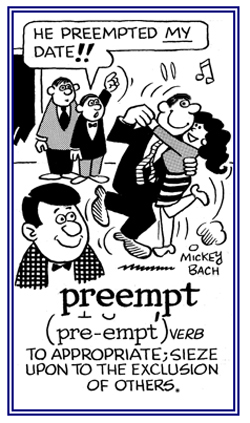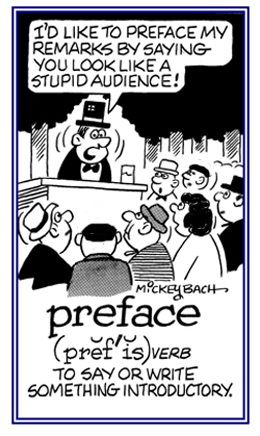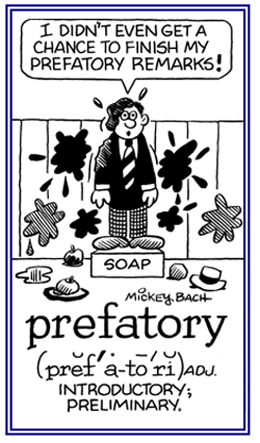pre-, prae-
(Latin: before [both in time and place])
The prefix prae- can actually be substituted for pre- because both of them are different spellings for the same prefix meaning "before".
2. To dominate or to control someone or something: While cooking the spaghetti sauce, the smell of garlic predominated all the other ingredients that were used!
3. To be larger in number, quantity, power, status or importance: Hispanics predominate in the Los Angeles neighborhood.
At the international conference, the English language predominated all the other languages the members were speaking.
4. To appear very large or to occupy a commanding position: The gigantic tree predominates over the water fountain.
2. To take some action that makes the plans of others become irrelevant or insignificant: The U.S. President's speech will be preempting, or replacing, the regular TV program while it is being delivered.

Go to this Word A Day Revisited Index
so you can see more of Mickey Bach's cartoons.
2. The presence of a soul in an earlier manifestation: Lois always thought that there must have been some preexistence of her spirit, perhaps in another country!
Sam and his family were amazed at how quickly their new house was erected after it was delivered from the factory that had prefabricated it.
One company prefabricated separate pieces for tables and other furniture so the buyers could set them up in their homes quickly and without any problems.
2. Etymology: from Latin praefari, "to say before, to introduce"; from prae-, "before" + fari, "to say, to speak."

Go to this Word A Day Revisited Index
so you can see more of Mickey Bach's cartoons.
2. Etymology: from Latin praefatus, from praefari "to say before"; from prae-, "before" + fari, "to speak" + -ory, "relating to, doing."

Go to this Word A Day Revisited Index
so you can see more of Mickey Bach's cartoons.
2. A senior student having the status of power over other students: One function of a prefect in a British school is to have authority over the younger students and also help to control them.
3. A person who is an administrator or executive in a government agency: The term prefect is a bit old-fashioned but can be used to designate an individual in charge of the military or even the US President who is the military commander-in-chief.
The broker at the bank, Mr. Smith, consistently prefers investment certificates rather than savings accounts.
Related before-word units: ante-; antero-; anti-; pro-.
Related "time" units: aevum, evum; archaeo-, archeo-; Calendars; chrono-; horo-; Quotes: Time; tempo-.


